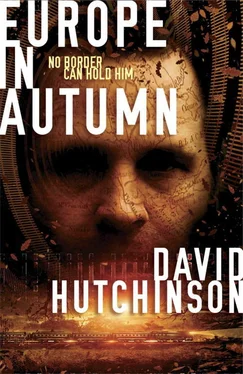“None of this helps me,” Petr said.
“No,” Rudi admitted. “And what I’m going to ask you to do next is not going to help you, either.”
IT WAS MARCH and she was thinking about taking a holiday. March was when the snow started to get patchy and rotten but it was still too cold to hike or sunbathe unless you were of a sturdy constitution. Of course, espionage was no respecter of the seasons, but early spring seemed to be the time of year when Europe’s many intelligence services declared, if not a truce on the scale of the British and Germans playing football in No Man’s Land during World War I, at least an informal relaxation of activities. In all her years in counterespionage, nobody had ever made trouble for her in the spring, and she had a good capable team working for her in case anything did start while she was away. Once upon a time she had stayed at her post all year round, obsessed with the thought that the moment she left something terrible would erupt. But these days she had learned to let go a little. She could spare a few days with her feet up somewhere.
That just left the decision of where to go, what to do, so she’d spent the past couple of days surfing the internet looking for something interesting. She was currently quite taken with the idea of a paragliding holiday in Wales.
Her phone rang. She said, “Yes?”
“I just had a call from Immigration,” said Pavel. “They had a flag go up.”
She frowned and gestured back from the paragliding site to her desktop, where flag alerts usually popped up as little red Gremlins. “I don’t see anything.”
“It’s an old flag, from before the last system update. Immigration had it on their database but it didn’t get copied over when we upgraded.”
She sighed. “What’s the name?”
“Tonu Laara,” said Pavel. “Estonian national.”
She looked through the window on the other side of her office. Beyond the glass a wall of trees dropped obliquely into a mountain valley.
She looked at the view for so long that Pavel said, “Chief?”
She blinked. “Where is he?”
“He booked into the hotel at Pustevny.” He added, “The flag was tagged ‘observe, do not detain,’ so Immigration observed him and didn’t bother to let us know until now. He’s been here two days.”
Yes, well. She was long overdue for a quiet chat with Major Menzel, the head of the Immigration Service. But not today. “Do we have anyone up there right now?” she asked.
“Rikki and Colin.”
She rubbed her eyes. “All right. Tell them to stay in contact but not to approach. I’ll go up there.”
“Yes, Chief.”
“And Pavel?”
“Yes, Chief?”
“It’s pronounced Tonu ,” she said, getting reluctantly to her feet and bidding a silent farewell to her holiday.
HE WAS SITTING in the hotel’s bar, nursing a beer and smoking a small cigar. He looked thinner than she remembered, a little more careworn. There was grey in his hair and a walking cane propped against the chair beside him, but he still looked ridiculously young. She walked right over to his table and sat down opposite him. And then they sat looking at each other. There is a peculiar intimacy between two people who have made love and then parted, only to be reunited many years later. Particularly if they spent the whole of their time together lying to each other.
“Short hair suits you,” Rudi said finally.
“And you’re doing what here, exactly?” she asked in what she hoped was a firm but not unkind tone of voice.
“Do you want a drink?” he asked.
“No thank you.”
“I have a story to tell you,” he said. “But first I want to claim political asylum.”
She watched him without saying anything.
“And then,” he said, picking up his beer, “I want to talk to the Hungarians.”
THE HUNGARIANS ARRIVED on Friday, five huge men in beautifully-designed casualwear driving up in a Peugeot hybrid 4X4 that looked as though it could tow ships up and down the Panama Canal all day. Discreet surveillance established that they were not carrying weapons beyond the odd Swiss Army knife. They checked into the hotel and headed immediately for the restaurant.
She had packed the place with her own people two hours before the meeting, but some bona fide guests had still wandered in and ordered meals, including a young black man she remembered seeing in the bar on the day Rudi made his reappearance. She walked over and sat down at his table.
“You know,” she said in her sexiest voice, “I think you’re really hot .”
He looked up from his menu and said, “Excuse me, miss?” in English.
“Oh, I love the English,” she said in English. She batted her eyelashes at him.
He sighed and laid his menu down. “Very good, miss,” he said. “And I’ve spotted your people too. Although it would be fairer to say that I’ve spotted the people who aren’t your people.”
She saw Rudi coming into the restaurant. “Come on,” she said. “You may as well sit in and listen to what the adults are talking about.”
If Rudi was surprised to see her coming across the restaurant with Seth, he made no sign. They all sat down at the Hungarians’ table and then everyone just looked at each other.
“So,” said Rudi. “I have a proposition.”
The leader, the one who had called himself Kerenyi, looked at him. “You’ve been through the mill. It shows on your face.”
“I’ve had some interesting times.”
“And not all in the kitchen.”
“No. Very few of them in the kitchen. I’m going to tell you a story now and I’d prefer it if you saved any questions, comments and jokes until I’m finished. Okay?”
Kerenyi nodded.
And so Rudi told the story again, of a family of English mapmakers and a parallel Europe where dissidence was subtly and totally suppressed and nobody could leave.
“Coureur Central seems to have mixed views about the whole business,” Rudi said. “On the one hand, they would love to get into the Community because it has no borders. You can walk from one end of it to the other and never see a border post or a customs man. Which makes it very handy. You could take a Package into the Community just outside Madrid, say, transport it all the way across Europe, and pop out again in, say, Helsinki, and nobody here would be any the wiser. Seth and I were smuggled across the border into Scotland like that. At least one dissident found her way out of the Community and set up her own little Coureur operation there.
“On the other hand, Central doesn’t want anyone else knowing how to do it, and they’re willing to kill to stop the secret getting out. And so, it seems, is everyone else who wants to know how to do it. The Line seems to be mixed up in all this somewhere, I’m not sure how yet. And in the background the Community is doing everything it can to keep its borders secure.” He looked around the table. “I have some evidence that they may have been responsible for the Xian Flu.”
“This is all bullshit,” Kerenyi said amiably. “You had a knock on the head or something.”
“They have a university. A very, very big university. It’s been doing a lot of biological research. Some years ago their intelligence service got very worried about… something. I think maybe it was the construction of the Line, maybe they were worried they couldn’t negotiate with the Line Company or something, I don’t know. And whoever runs the Community sanctioned the use of biological weapons against us to stop it. That’s what I’m told, anyway. And that’s murder on a completely unimaginable scale, right there. Someone needs to shake these people up.”
Читать дальше







